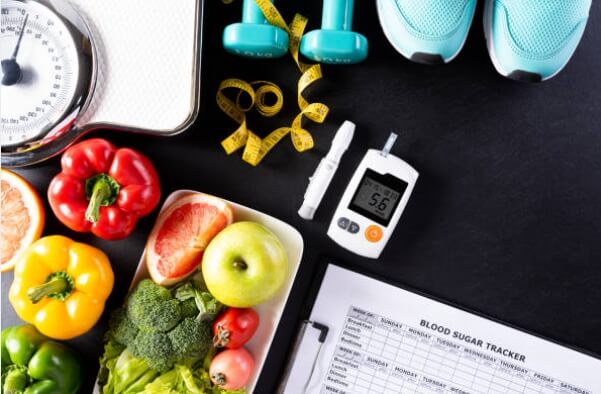
Nobody is safe from developing type 1 or 2 diabetes. According to data, published by WHO (World Health Organization), more than 422 million people suffer from it. Type 1 diabetes is genetically-bound and manifests itself in the early teens. It is characterized by a complete lack of ability of the body to produce insulin. Type 2 diabetes affects adults and is usually caused by unhealthy dietary and lifestyle habits. There is also pregnancy diabetes that manifests itself in the 3rd trimester and goes away once the woman gives birth. People often try to tackle the symptoms of the disease by taking medicine. But the truth is that there are many home remedies that can help them fight them successfully.
The disease is often characterized by weight problems. People either have problems gaining or losing weight. This is mainly due to the body’s inability to distribute and absorb insulin normally. There is also the risk of developing blood pressure and cholesterol issues. The disbalance in the body causes blood vessels to sclerorise and thicken. Not to mention that it worsens the functioning of the pancreas and liver. There are many natural products that can help individuals control their symptoms. One of them is the Diabex natural capsules.
Which are the best home remedies for diabetes? How can I overcome the symptoms naturally? Which are the best foods for diabetic recovery? Should I limit my intake of sugar and sweets? Is there a way to improve insulin balance?
Learn more about the best home remedies for diabetes in the following article!
Diabetes – What Is It & How to Recognize the Symptoms

The term diabetes mellitus describes a chronic metabolic-endocrine disorder, primarily of carbohydrate metabolism. It is caused by insulin deficiency or reduced insulin sensitivity. The main characteristics include persistently elevated blood sugar levels (hyperglycemia) and certain acute and chronic complications. Diabetic ketoacidosis and hypoglycemia are commonly acute. Vascular and nerve damage are the most important chronic complications. You can avoid them by relying on the natural action of the GlucoNol pills.
In practice, diabetes mellitus affects all cellular exchanges, except for carbohydrates, proteins, and fats. Although there are other types of diabetes, when we say ‘diabetes’ we mean diabetes mellitus, due to its greater frequency than the other types. The most common types of diabetes are type I and type II. The name comes from Ancient Greek and denotes diseases, associated with excessive loss of fluids and/or specific metabolic products through the kidneys, i. e. increased urine output (polyuria).
These are the two most common types of diabetes and their characteristics:
- Type I. It usually debuts in patients under 20 years of age and is classified as an autoimmune disease. There is a certain genetic predisposition for its development. In the course of the autoimmune process, the beta cells of the pancreas are destroyed and this leads to the cessation of insulin production and secretion, i. e. to an absolute insulin deficiency. About 10% of all diabetics suffer from type I.
- Type II. This variety manifests itself in adulthood. It is characterized by insulin resistance, especially, in the liver and muscles. There is also a disturbance in the function of the pancreas can also be observed. The most important risk factor for developing type II diabetes is obesity and the lifestyle associated with it. About 90% of diabetics suffer from type 2 diabetes.
What Is Pregnancy (Gestational) Diabetes

Generally speaking, pregnancy has a diabetogenic effect. During its course, higher demands are placed on the cells that produce insulin in the pancreas. This feature of pregnancy, combined with the individual predisposition of the body can lead to the appearance of diabetes. Gestational diabetes usually appears in the second trimester of pregnancy and disappears after delivery. About 50% of women with gestational diabetes are likely to develop insulin-dependent diabetes later in life.
This is how to recognize the symptoms of pregnancy (gestational) diabetes:
- Excessive Thirst & Increased Fluid Intake;
- Frequent & Profuse Urination;
- Vomiting;
- Appearance of Skin Infections;
- Occurrence of Fungal Infections in the Vagina;
- Dry Mouth Syndrome;
- Hypertension;
Hypoglycemia – What Is It & Main Symptoms
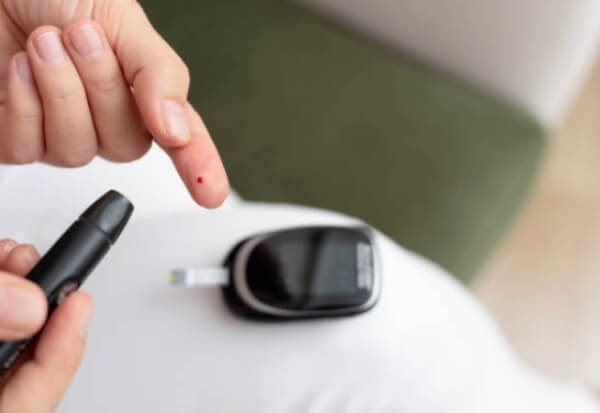
In hypoglycemia, blood sugar levels are very low. But it can also happen in people who have not been diagnosed with diabetes. Since it is divided into reactive and non-reactive, the occurrence of reactive hypoglycemia can mean that you are at risk of developing the disease.
Prevention is related, as with diabetes, to the regular measurement of blood sugar, adherence to a healthy diet, and physical activity. Untreated hypoglycemia can lead to seizures, stroke-like neurological problems, and loss of consciousness. You can prevent the development by taking the Diolix drops.
The symptoms of hypoglycemia are:
- Pale Skin;
- Vertigo;
- Headache;
- Confusion;
- Trembling;
- Blurred Vision;
Which Is the Best Diet for the Different Types of Diabetes
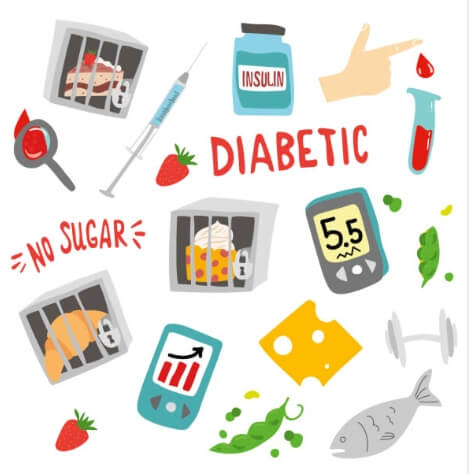
A healthy diet is a basis for the management of various diseases, including diabetes. In some cases, a change in the menu plan may be enough to control the symptoms without having to take medication. Expert endocrinologists and dietitians advise us to focus on the keto diet or Mediterranean diet foods. Both nutritional regimens help with the improved balance of blood pressure, sugar, and cholesterol levels. They make the body distribute insulin normally and give energy during the day.
This is how to eat if you have type 1, type 2, or gestational diabetes:
- Dietary Tips for Type 1 Diabetes: Blood sugar levels rise or fall, based on the types of foods that are consumed. Starchy or sugary foods cause blood sugar levels to rise quickly. Proteins and fats cause a gradual increase. In most cases, it is recommended to limit the number of carbohydrates according to the intake of insulin. Getting the right balance of protein, fat, and carbohydrates can help control blood sugar. Many people with this problem turn to the keto diet since it is based on a low-carbohydrate diet. It is recommended that the menu be drawn up by a nutritionist.
- Dietary Tips for Type 2 Diabetes: Controlling carbohydrate intake is also an important part of a type 2 diabetes diet. Meanwhile, the right kinds of foods can both control your blood sugar and help you shed the extra pounds that are often a problem. Small, frequent meals that include fruits, vegetables, lean proteins, and healthy fats are recommended.
- Dietary Tips for Gestational Diabetes: A well-balanced diet is important for both pregnant women and babies during these nine months. Making the right food choices can also help predisposed moms to avoid diabetes medications. It is recommended to limit sweet and excessively salty foods, as well as those with a high carbohydrate content.
Nutritional Supplements That Help People Control Diabetes
Taking dietary supplements for diabetes helps our body function properly. Some vitamins and minerals contained in them are involved in maintaining blood sugar within normal limits. They also help slow down the progression of the disease. Most people suffering from this condition are deficient in important micronutrients. This is what makes diabetes supplements so necessary for this group of people. Another benefit is that they help the immune system by strengthening it. One of the best products for the natural recovery of normal blood sugar levels is DiaDrops.
These are the ingredients that are most commonly found in the best natural supplements for diabetes control:
- Alpha-Lipoic Acid;
- Chrome;
- Magnesium;
- Vitamin D;
- Zinc;
- B-Group Vitamins;
5 best home Remedies for Diabetes
#1. Eggs

Eggs have some great benefits for diabetics, including the fact that they improve insulin sensitivity and enhance HDL cholesterol. They change the size and shape of LDL cholesterol, decreasing it to a minimum. In addition, eggs consist of 77 calories, 6 grams of protein, and 5 grams of healthy fat. One of the best qualities of eggs is that they keep you full for hours, thus helping you resist the urge to eat unhealthy foods. Our advice is to eat the eggs whole because the yolk is the main source of nutrients.
#2. Fiber-Rich Vegetables – They Lower Blood Sugar & Cholesterol Levels
Vegetables such as peas, beans, and spinach are rich in fiber, making them an ideal addition to a diabetic patient’s diet. Beans are also a great source of protein, and studies have found that they help lower blood sugar and blood pressure. Also, the American Heart Association suggests that fiber consumption may reduce the risk of a first stroke. And researchers found that each 7-gram increase in total fiber intake was associated with a 7% lower risk of a first stroke.
Our recommendation is to add legumes to your diet as a major source of protein and eat them, at least, once or twice a week.
#3. Apples – One a Day Keeps the Doctor Away
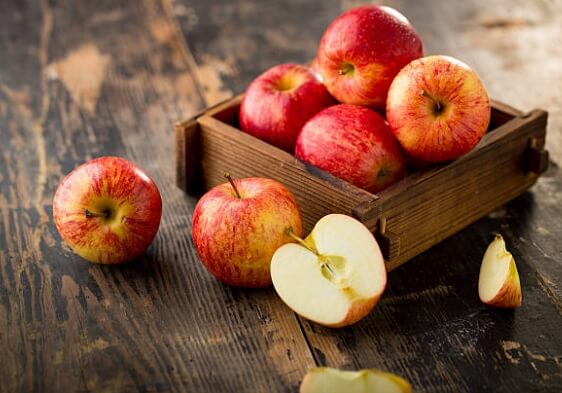
We’ve all heard the age-old tales of apples and doctors. The good news is that they still hold true, and, in fact, apples may even protect against diabetes. A Harvard School of Public Health study looked at the diets of 200,000 people. It determined that participants who reported eating 5 or more apples per week had a 23% lower risk of developing type 2 diabetes than those who didn’t. One of the great advantages of apples is their low carbohydrate content which is only 15g. for one small apple.
#4. Seafood

Fish and seafood are among the healthiest foods—it’s loaded with important nutrients, like protein and Vitamin D. Seafood is also rich in Omega-3 fatty acids which are important for brain and body function. Also, most fish and seafood are easy to prepare but extremely tasty. Salmon is a good choice for the diet of people with diabetes. It is a healthy protein source that will not raise blood sugar levels. It will also help reduce the risk of heart disease and stroke, a major concern for diabetics.
#5. Beef Meat – Extra Energy

As with eggs, we must make sure that we buy a high-quality product. Meat from free-range animals is generally lower in fat and has a higher percentage of anti-inflammatory properties. It also contains more antioxidants and higher amounts of conjugated linoleic acid which may reduce the risk of heart disease and cancer.
A Healthy Diet Keeps Diabetes Away & Makes Your Life Better
The best bit of advice that experts give to people who suffer from type 1 or 2 diabetes is to eat healthily. Nothing improves the internal balance, like making sure that the body receives a sufficient supply of nutrients. This makes for the natural balance of blood sugar and cholesterol levels. Also, do exercises and keep the weight under control.
- Boostella Reviews, Price, Results, Side Effects 2025 - 14/04/2025
- Potens HardMax Reviews, Price, Results, Side Effects 2025 - 11/04/2025
- Liposivin Reviews, Price, Results, Side Effects 2025 - 08/04/2025

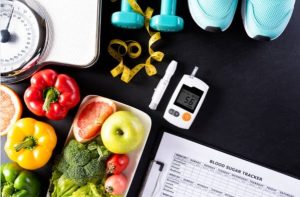
![Full-On Body Care Guide [year] - How to Shower Properly & Choose the Right Cosmetics](https://nature-tricks.com/wp-content/uploads/2021/11/body-care-how-to-shower-properly-5-300x212.jpg)

